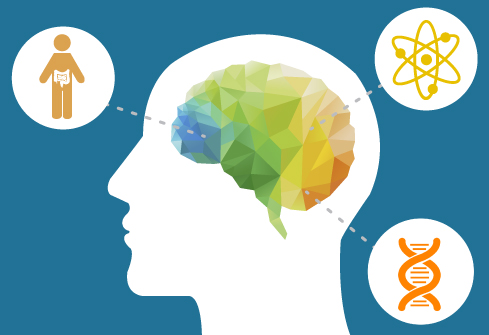Tips for Better Brain Health: Our Clinical Nutritionist’s Master Checklist
Posted by in Uncategorized
In the month of April, we acknowledge National Autism Month and the population of Americans on the autism spectrum. As we pause to reflect on this condition, what becomes most alarming is how quickly the statistics are rising: about 1 out of every 68 children in the USA is now “on the spectrum,” a figure unbelievable to many of us. And though baby boomer children were not affected in such numbers, many of us boomers are parents, grandparents, aunts, and uncles to special needs children and young adults.
But young people aren’t the only ones experiencing an unusual surge in brain disorders. The number of adults in their ’40s and ’50s diagnosed with mild cognitive impairment is also rising, and so is early-onset dementia and Alzheimer’s in people in their ’60s and ’70s. For those of us treating these populations, the questions we keep asking are why are these brain disorders occurring in such numbers, and what are the biological mechanisms in cells, organs, and systems that contribute to these conditions? And, just as importantly, why is it happening now? It is easy to try to blame genes, but as the truth of science bears out, it’s impossible to have a genetic epidemic.
For almost twenty years, I have described my work with clients as “working in the trenches.” In an attempt to dig for information, I have pursued an extensive amount of postgraduate education to uncover as much as I can about the causes that might predispose and contribute to an individual developing these conditions. These causes are seemingly countless, but they fall into three main groups:
- 1. Genes and genetic variations
2. External influences like environmental toxins, infections, and allergens
3. Internal influences specific to the gastrointestinal system, like the gut bacteria, the endocrine glands (which produce hormones), the immune system, and the processes of detoxification
Clean up your environment:
- Reduce your exposure to toxins by creating an organic yard, if you have one. Substitute chemical weed killers (which have been linked to Parkinson’s) with homemade alternatives, and replace chemical fertilizers with organic compost.
- Replace harmful household cleaning supplies with nontoxic and environmentally friendly alternatives. Or just make your own—this simple tutorial is a great place to start.
- Avoid the use of aluminum pots, pans, and foil. The jury’s still out on whether aluminum contributes to Alzheimer’s, but it’s smart to stay on the safe side.
- Replace plastic storage and beverage containers with glass alternatives, which do not contain BPA or other harmful chemicals.
- Use Hepa filters in your air conditioning unit and when necessary as free-standing air purifiers.
- Double-check the ingredients in your cosmetics, perfumes, and personal care products. Search for them in this database, and if some of them are dangerously toxic, replace them with healthier alternatives.
Clean up your diet:
- Choose organic fruits, vegetables, and grains when you can—especially when you’re buying produce on the Dirty Dozen list.
- Choose hormone-free, antibiotic free, and organic meat and dairy products when available.
- Reduce your intake of refined, processed, and modified foods.
- Avoid foods containing hydrogenated fats.
- Avoid foods and beverages containing high-fructose corn syrup.
- Avoid foods containing artificial sugars, dyes, flavors, and preservatives.
Clean up your gut and balance your immune system:
- Refer to my article on maintaining a healthy colon and check into your bowel habits.
- If tolerated, add fermented foods and drinks (like yogurt, kimchi, and kombucha) to your diet.
- Support your gastrointestinal microbiotia and function with viable strain probiotics.
- Add healthy sources of fiber such as flax, chia, and hemp seeds to your diet.
- Add healthy fats to your diet, including cold-pressed extra-virgin olive oil, coconut oil, avocado oil, and nut and seed oils.
- Augment your dietary fat intake with a high-quality omega-3 supplement.
- Reduce your intake of sugars and refined grains.
- Treat signs of inflammation with effective botanicals such as turmeric and bromelain.
- Treat infections naturally and without antibiotics when possible; however, always follow the advice of your doctor.
- Follow these tips on how to raise your immunity.
- Add blended green drinks and juices to your diet. Try this simple recipe if you’re not sure where to start.
By slowly and consistently integrating these suggestions into your lifestyle, you will begin the process of building healthy internal and external environments that reduce your risk of having a brain “under siege.”
(Original Post on Boomshop)
You can follow any responses to this entry through the RSS 2.0 You can leave a response, or trackback.



Leave a Reply